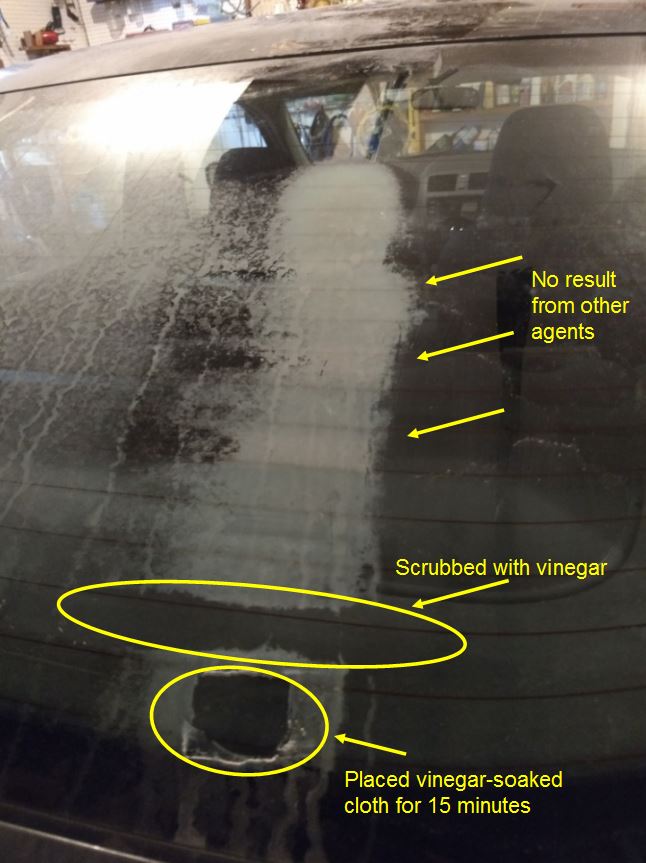Regarding car maintenance, various materials and products can be used to clean and shine the vehicle’s exterior. However, one thing many people don’t consider is whether or not a specific product can cause damage to the vehicle’s paint. Vinegar is a popular household item and is often used to clean the exterior of vehicles. But is it safe for auto paint?
Vinegar can damage auto paint if it is left on for an extended period without being wiped off. So, if you are using it to clean your car, be careful and rinse it off right away.
Here, I’ll explore the potential for vinegar to damage auto paint and provide tips on how to use vinegar safely on car surfaces. So keep reading to learn more!
What Are the Risks of Vinegar Damage to Auto Paint?
When cleaning your car, you may think twice before reaching for the vinegar bottle. It has the potential to damage auto paint, so it is important to understand the risks before using it on your car.
Risks of Acid Etching and Corrosion
As mentioned earlier, vinegar is an acid, and the acidity of vinegar can potentially etch or corrode certain materials. This is especially true for materials already prone to damage from acidic substances, such as marble or limestone.
Regarding car paint, the risk of acid etching or corrosion is generally low, but it is still important to be cautious when using vinegar on car surfaces.
Factors That Can Increase the Risk of Damage
There are certain factors that can increase the risk of vinegar damaging car paint. For example, if it is left on the paint for an extended time, it may have a greater chance of etching or corroding the paint.
Similarly, applying it in a concentrated form without diluting it with water can also increase the risk of damage.
Types of Car Paint That May Be More Susceptible to Damage
Certain types of car paint may be more susceptible to damage from vinegar than others. For example, older or damaged paint may be more prone to etching or corrosion.
It’s also worth noting that some car manufacturers may recommend against using vinegar on their vehicles, as it may void the warranty or cause damage to certain types of paint or finishes.
Can Vinegar Help Stop Knots From Bleeding Through Paint on My Car?
Yes, vinegar can help stop bleeding knots from bleeding through paint on your car. Before painting, apply vinegar to the knots and let it dry. This will seal the knots and prevent them from bleeding through the paint. Learn more about how to stop bleeding knots to ensure a smooth paint job on your car.
Is Vinegar Safe to Use on Wood Surfaces?
When it comes to using auto paint on wood, it’s important to proceed with caution. Vinegar, on the other hand, can be a safe and effective option for cleaning wood surfaces. Its acidic properties make it an excellent natural cleaner for removing dirt and grime without damaging the wood.
Tips for Using Vinegar Safely on Car Surfaces
Using vinegar on your car surfaces can be a great way to remove dirt and grime, but it’s important to use it safely. Here are some tips for using vinegar safely on car surfaces.
Dilute the Vinegar with Water
One of the simplest and most effective ways to use vinegar safely on car surfaces is to dilute it with water. Mixing equal parts vinegar and water will create a less acidic solution and less likely to damage the paint.
You can also adjust the concentration of the solution based on your needs and the condition of the car’s paint. For example, you may want to use a more robust solution for particularly dirty or greasy surfaces, but a weaker solution may be sufficient for light cleaning.
Only Use Vinegar on Small Areas at a Time
Another tip for using vinegar safely on car surfaces is only to use it on small areas at a time. This will help to prevent the vinegar from sitting on the paint for an extended time and increase the risk of damage.
It’s also a good idea to work quickly and efficiently when using vinegar on car surfaces, as leaving it on the paint for too long can increase the risk of damage.
Consider Alternative Cleaning Agents
If you’re still concerned about the potential risks of using vinegar on your car’s paint, there are alternative cleaning agents that may be less risky.
Mild soaps or specialized car-wash products are generally safe on car surfaces and can effectively remove dirt and grime. It’s always a good idea to follow the manufacturer’s instructions and take caution when using any cleaning agent on your car.
Does Vinegar Remove Water Stains?
Conclusion
Here, I explored the potential risks and benefits of using vinegar to clean car surfaces. While it is a natural and eco-friendly cleaning agent with excellent cleaning and antibacterial properties, it is important to know its potential risks to car paint.
The acidity of vinegar can potentially etch or corrode certain materials, and certain factors, such as the concentration of the vinegar and the type of car paint, can increase the risk of damage.
However, diluting the vinegar with water and only using it in small areas can significantly reduce the risk of damaging the car’s paint. Alternative cleaning agents, such as mild soaps or specialized car-wash products, may also be less risky for car paint.
Overall, use caution when using any cleaning agent on your car and to follow the manufacturer’s instructions. Taking these precautions lets you keep your car looking clean and shiny without damaging the paint.
